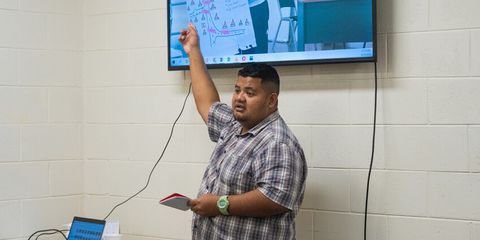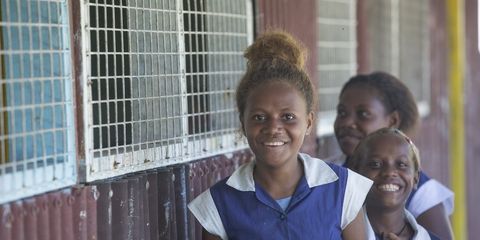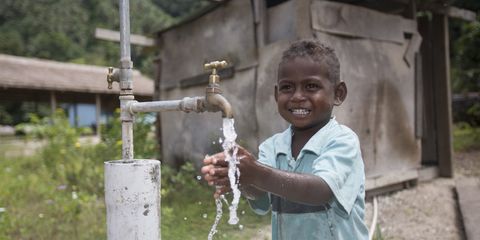Girls call on community leaders to make their city safe
22 October 2020Girls in the Solomon Islands are identifying threats to their safety in the city of Honiara and are calling for change.
Sisters Neslyn, 20, and Monica, 19, live with their parents and siblings in Honiara, the capital of the Solomon Islands. Both have finished school and hope to get a scholarship to study overseas.
Their local community is friendly and safe but to get to and from the centre of Honiara the girls must walk along a path that has frequent threats and reminders of gender-based violence, including the rape of their aunt.
Threats in the community
“We are only safe around our community in the daytime, not at night.” Neslyn says as she and her sister Monica, 19, take part in a safety walks.
She identifies the area where she feels most unsafe – the local bus stop. “Sometimes when I’m going into town and come back late this place is unsafe for me. At the weekends boys drinking alcohol call out abusive names to girls. When I’m dropped off from the bus some people shout names at me and I feel hurt.”
The girls say that at night boys gather here and yell at or touch the girls. The boys drink homebrew alcohol that’s incredibly strong and it’s not unusual for girls to end up pregnant. Even as the girls guide us on the safety walk, in broad daylight, boys yell at the girls from the windows of passing buses.
Girls call for increased safety
“In the community, we should have more streetlights and more awareness. We should talk about things that aren’t safe for girls,” Neslyn says.
“Police should do patrols,” Monica adds. “They only do them when problems happen in the community.”
On the safety walk Monica identifies the place she feels unsafe as the spot where her aunt was raped. It’s a path the girls must pass every day.
The girls help their family run a business selling top-up credit for mobile phones. The money goes towards food and household expenses, and occasionally hygiene products for the girls.
The girls learnt about sex education at school. “When having sex, use condoms and take birth control pills, that’s all,” Monica says. “The boys and girls were separated during the lessons.”
And do they know how to access contraception? “Yes, we can go to the clinic. It’s free.” Why do they think girls are still falling pregnant then? “Because of unsafe sex. Some girls just ignore the advice.” Monica says.
Tackling the patriarchy
When it comes to decision making in the community, in the Solomon Islands it sits largely with the men. “In the Solomon culture, the father is the head of the family, so he is the one who makes all the decisions. We just listen to what he says.” Monica says. “But if we don’t like what our dad says we just tell him.”
“Here girls are not involved in decision making in the community, but girls have the right to,” Neslyn says. “It would be nice if we had more girls involved in making decisions, talking about girls’ rights. We need more girls. We need community leaders to work with girls and boys. To raise awareness that boys should respect girls and girls’ rights.”
“I think that the Prime Minister should bring girls in front of the members of the parliament to tell them about their rights. Now, they only talk to adults, but they don’t listen to girls. But girls have more ideas that they don’t expect, and we have the right to talk to members of parliament.”
Safer cities
In the Solomon Islands, Plan International’s Safer Cities for Girls project aims to improve adolescent girls’ safety, mobility and access to public spaces and transport in cities.
Safer Cities for Girls is a joint programme developed in partnership between Plan International, Women in Cities International and UN-HABITAT. In Honiara, the programme is supported by the Australian Government through the Australian NGO Cooperation Programme.
Campaigns, Protection from violence, Youth empowerment, Gender-based violence, girls’ leadership, Safer Cities


